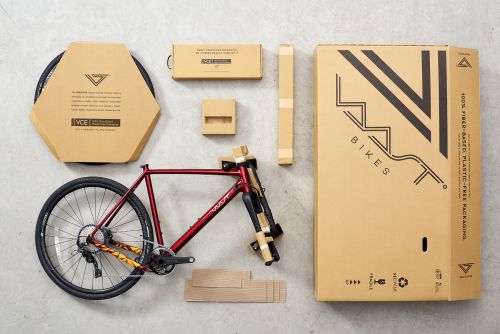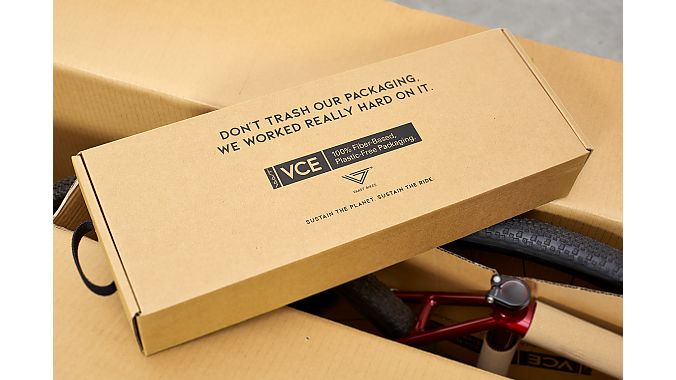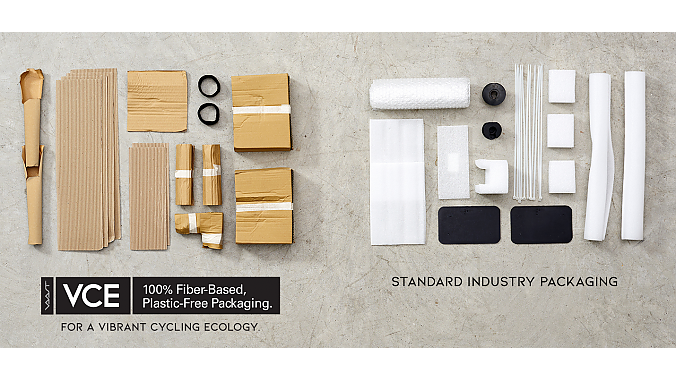MIAMISBURG, Ohio (BRAIN) — Challenge accepted.
Encouraged by a BRAIN cover story from July 2019 about the industry lagging behind other outdoor segments in sustainability, VAAST Bikes revamped all packaging, making it plastic-free and unveiling it in March.
"It's been on our minds since the inception of the brand in 2018," said Joey Burke, marketing manager at VAAST. "The team began looking into packaging ideas in spring 2019, but it was not until BRAIN presented a challenge to the bike industry as a whole to do better sustainably that we decided to make this initiative a priority — to send our first shipment of bikes with sustainable packaging."
VAAST, which also launched last year as the first line of performance bikes using 100% recyclable ALLITE Super Magnesium frames, says it is the first cycling brand to use 100% recyclable fiber-based packaging constructed from recycled products. It also employs Velcro straps, which can be used for other purposes, VAAST said.
An industry sustainability expert who contributed to the BRAIN cover story was encouraged by the news.
"Well, I would need a lot more detail to comment thoughtfully," said Bryant Bainbridge, former Specialized Bicycle Components director of corporate responsibility who holds a degree in environmental studies and first worked as a wildlife biologist. "But on the face of it, eliminating plastic (save the Velcro) is a huge step in the right direction, and I applaud their efforts. Hopefully, this starts a trend where other brands begin to look at their single-use plastic consumption."
The cycling industry has traditionally used non-recyclable plastic foam and PVC zip ties, and VAAST estimates 8 million metric tons of plastic ends up in oceans. Brainbridge said last year that microplastics, the shedding of polyester bits every time doing the laundry, is in the city water supplies and also airborne. A report commissioned by the World Wide Fund for Nature and executed by the University of Newcastle in Australia last year provided the first global glimpse on plastic's impact on people. The findings: Humans consume about 2,000 pieces of microplastic every week, 21 grams a month, and just more than 250 grams a year.
Sensing the need to do something to help, VAAST designed its new packaging across its complete line of bikes at additional company cost, Burke said. "We chose our materials based on ease of recycling and reusability while balancing cost to be as reasonable as possible," he said.
Burke said the first production has already arrived at bike shops across the country.
"The bikes are very secure in shipping, and feedback from shops receiving bikes has been good," Burke said. "In the development process for this new packaging, we tested to make sure the new materials protect the bike equally as well as standard plastic packaging, ensuring that bikes arrive safely to their destinations."
Bainbridge said that's a key factor in any company re-evaluating its packaging.
"The other critical piece is 'light weighting' or simply using less of everything through more creative and careful box design," Bainbridge said. "I would love to see how or if they have approached this issue. Finally, any change in packaging requires testing and confirmation that the product enclosed arrives safe and sound and in the same condition it would have in the original packaging. To state the obvious, making a positive change in packaging sustainability that results in any increase in damage to the product in shipping is a big step backwards in sustainability, given the huge resource investment in making a bicycle."
Recyclable packaging is the latest in VAAST's Vibrant Cycling Ecology Pledge, "a promise to operate the business mindfully, with environmental responsibility at the forefront of all business decisions." It does this by:
- Adapting and updating its manufacturing processes.
- Supporting a sustainably focused Super Magnesium Cycle with entirely recyclable frame materials.
- Partnering with suppliers that share the same values, such as Stan's NoTubes and Green Worldwide.
- Achieving Green Business Bureau Certification.
- Achieving Green America Certification.
VAAST is working toward B-Corp Certification, the highest recognized standard of verified social and environmental performance, once it is eligible. Chris King Cycling Components is the only bike company to have B Corp certification currently.
"Mostly a lot of hard work from our product team and our suppliers to actually execute," Burke said about what went into making a sustainability commitment. "The biggest challenge has really been trying to quantify the impacts beyond just 'common sense' relative to saving plastics, etc. It is important to note that we do not believe we have solved the issue; we have taken a step in the right direction. We did what we could with the resources we have available and have started to look outside the industry for help. We've consulted with sustainability experts in other fields to get a more holistic understanding."








